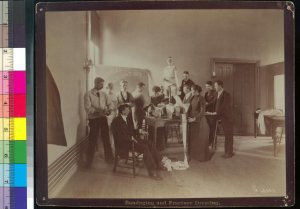Presented By: Bentley Historical Library
Making Michigan: How U-M's First Hospital Made History

Medical training in nineteenth-century America was unregulated and erratic. Future doctors learned their craft from apprenticeships or in medical schools with wildly varying standards. When U-M came to Ann Arbor in 1837 calls for creating its own medical school were widespread, but it did not open one for another decade. Even so, it rapidly became the University’s largest department and in 1870 became the first medical school in the country to admit female students. The early medical curriculum was centered around lectures and recitations; students seeking more practical training were on their own. And Ann Arbor was a small town, forcing them to travel elsewhere in search of it. Seeking to change this, in 1869 U-M became the first university in the country to open its own hospital. In so doing transformed medical education both for itself but also for the United States.
Joel Howell received his BS at Lyman Briggs College at Michigan State University, his MD and residency in internal medicine at the University of Chicago, and his PhD in the History and Sociology of Science at the University of Pennsylvania. At UM he is the Elizabeth Farrand Professor of the History of Medicine and is a professor in the Department of Internal Medicine in the Medical School, in the Department of History in LSA, and in the Department of Health Management & Policy in the School of Public Health. His historical research attempts to understand when (and why) we have become so convinced that the key to better medicine will come through technology and science, including projects in Brazil and Ethiopia. He has published extensively on the history of the University of Michigan. He is also the founding Director of the Medical Arts Program, which offers opportunities for medical students and residents to attend arts events and meet with artists, as well as to create art themselves (including both music and painting).
Joel Howell received his BS at Lyman Briggs College at Michigan State University, his MD and residency in internal medicine at the University of Chicago, and his PhD in the History and Sociology of Science at the University of Pennsylvania. At UM he is the Elizabeth Farrand Professor of the History of Medicine and is a professor in the Department of Internal Medicine in the Medical School, in the Department of History in LSA, and in the Department of Health Management & Policy in the School of Public Health. His historical research attempts to understand when (and why) we have become so convinced that the key to better medicine will come through technology and science, including projects in Brazil and Ethiopia. He has published extensively on the history of the University of Michigan. He is also the founding Director of the Medical Arts Program, which offers opportunities for medical students and residents to attend arts events and meet with artists, as well as to create art themselves (including both music and painting).